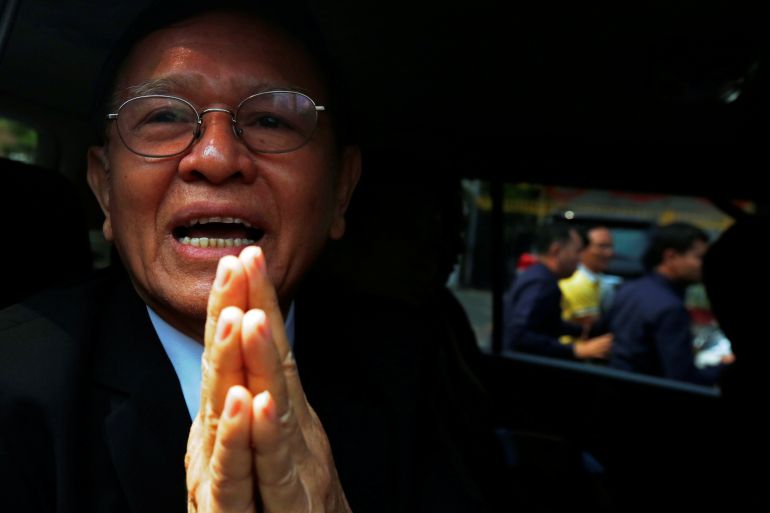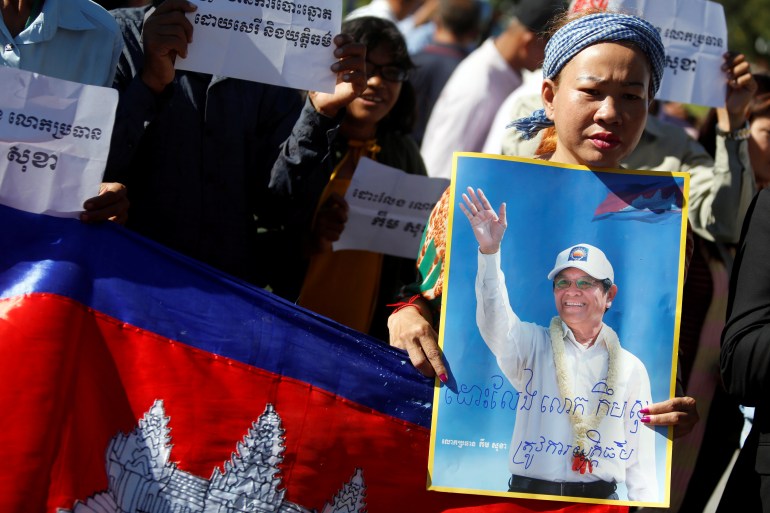Fair trial doubts as Kem Sokha treason case resumes in Cambodia
Opposition leader back in court after almost two years during which the government continued its crackdown on critics.

Phnom Penh, Cambodia – A Cambodian court on Wednesday resumes a treason case against main opposition leader Kem Sokha after an almost two-year delay blamed on the COVID-19 pandemic.
Kem Sokha, the former leader of the now-outlawed Cambodia National Rescue Party (CNRP), was arrested and charged with treason in 2017, a year before Cambodia held its 2018 national election.
Keep reading
list of 4 itemsProtests, anger as Hun Sen visits Myanmar’s military leaders
‘Just surviving’: For Cambodian tourism, recovery out of sight
A new Hun rises: Cambodia’s ruling party meets to plot its future
Sokha, 68, was accused of trying to overthrow the government with the backing of the United States. The case led to the forced dissolution of the CNRP, the main electoral threat to the ruling Cambodian People’s Party (CPP).
The CPP is led by Cambodian Prime Minister Hun Sen, who has been in power for more than three decades.
The international communities and many within the country have condemned the case against Sokha, calling it “politically motivated”.
“He shouldn’t have been imprisoned or charged,” said Ou Virak, president of Future Forum, a think-tank dedicated to public policy issues.
Despite broad criticism, the government has pressed ahead.
Chin Malin, a spokesperson for the Ministry of Justice and the government’s Cambodian Human Rights Commission (CHRC), claimed there was enough evidence for the case to proceed.
“Regarding the case of Kem Sokha, the court has correctly carried out its judicial authority in compliance with the law,” he said.
Sokha’s treason trial, which started in January 2020 was delayed soon after in March as the first cases of coronavirus began to emerge.
“Now we have COVID-19 under control, so we can move ahead with the trial,” Y Rin, Phnom Penh court spokesperson, told Al Jazeera.

Sokha’s defence team says they are “hopeful” and ready to defend the veteran politician in court.
“We, our-co lawyers, and our client are ready to go to trial,” said Sokha’s defence lawyer Chan Chen. “We have hope [to win]. As I have said before, my client has done nothing wrong as alleged.”
While the defence lawyers are positive about winning the case, many are more sceptical. Critics have condemned the proceedings as politically motivated.
“I would be surprised if he’s not found guilty. The court hardly acquitted political cases in Cambodia,” said Virak, a former President of Cambodian Center for Human Rights (CCHR), a local human rights organisation founded by Sokha.
“I am expecting further delays. The best-case scenario, unlikely, is a conviction and then a suspended sentence. Even so, Kem Sokha will not be automatically politically rehabilitated. That will require further political negotiation and compromise.”
Fair trial doubts
After local elections in 2017, in which the CNRP turned in a strong performance, hundreds of police raided Sokha’s house.
Sokha was arrested for treason, a charge that carries a maximum sentence of 30 years in prison. The charge was based on a video in which Sokha said he had received advice from the US on how to build up an opposition movement.
Critics and the international community have largely dismissed the case as spurious. They say the real reason Sokha was arrested was that the CNRP had become too popular.
“I fail to see any legal justification for his arrest. The government simply wanted to make sure the main opposition party (CNRP) would not be able to compete effectively in future elections and this was the main reason for his arrest,” said Sorpong Peou, a professor in the Department of Politics and Public Administration at Ryerson University.
“The Cambodian court remains highly politicised and is unlikely to give him a fair trial. Cambodian politics remain highly volatile because it is all about the politics of survival.
“The incumbent regime always faces what I call a legitimacy crisis and thus prefers to rely on coercive means to stay in power,” he said.

Cambodia’s judiciary system is one of the world’s worst, according to the World Justice Project (WJP).
In a report from October, which ranked countries based on factors such as the protection of fundamental rights, civil justice, regulatory enforcement, and absence of corruption, Cambodia finished second last – 138th out of 139 countries – just above Venezuela.
The US has continued to call on the Cambodian authorities “to stop politically motivated trials” against the political opposition, and dissidents such as Sokha, journalists, labour, and environmental activists, said Chad Roedemeier, the spokesperson for US Embassy Phnom Penh.
“Promoting democracy and respect for human rights is central to US foreign policy in Cambodia and around the world,” he added.
The CPP has long dominated the country’s politics and is completely entwined with all state and military institutions. Its central committee includes top judges, military generals and bureaucrats.
It faced its toughest electoral challenge in 2013 when it faced the CNRP, which was created through the merger of Sokha’s Human Rights Party and an eponymous party led by long time opposition figure Sam Rainsy.
The CNRP won 44 percent of the national vote on that occasion, and four years later secured almost half the vote in local elections.
With a general election looming, Hun Sen’s government moved to crack down on the opposition party and other critical voices, including civil society and independent media.
Hearing against Kem Sokha resumes today. Many including I myself, Adhoc, UN, and Australian Embassy representative, are put on reserve list meaning we cannot yet attend hearing as the court mentioned seats are limited. pic.twitter.com/4qJtEfjwGn
— Sopheap Chak (@sopheapfocus) January 19, 2022
With Sokha under arrest, the Cambodia Daily, an English-language daily owned by an American family and known for its probing journalism, was forced to close after it was presented with a hefty tax bill of more than $6m. Another independent newspaper, The Phnom Penh Post was forced to sell to a businessman reportedly tied to the government after it too was given a large tax bill.
Sam Rainsy, a longtime prominent leader and Sokha’s political partner at the CNRP, fled the country after he and his colleagues were charged with a myriad of cases.
In October 2021, he and his team including Mu Sochua, another prominent opposition politician, were charged with “conspiracy in treason and incitement to cause chaos to social security” under Cambodia’s criminal law, in addition to the multiple existing charges they already faced. Both are in exile.
“The entire trial is a farce, based on fabricated, politically motivated charges that bear no semblance to reality. The reason there is a trial is PM Hun Sen wanted an excuse to dissolve the opposition Cambodia National Rescue Party (CNRP) which was threatening his power by garnering significant support from the Cambodian people,” said Phil Robertson, deputy Asia director for Human Rights Watch.
“Sokha’s trial is a paramount symbol of Hun Sen’s purge of democracy, based on lies, intimidation, arbitrary arrests, and pliant, lapdog courts that answer to the ruling party only.”
Political deals
Previous waves of repression during Hun Sen’s 36 years in power have usually subsided after those targeted made political deals.
Sam Rainsy was granted a royal pardon that allowed him to return to the country from a previous period of exile and run in the 2013 election.
Other CNRP leaders have been allowed to re-enter politics after seeking so-called “rehabilitation” from the government.
Mu Sochua expects that Kem Sokha will be found guilty and the cycle will continue.
“It won’t be a fair trial; all charges are trumped up. It is total political manoeuvring to keep Hun Sen in power,” she said.
“Kem Sokha will be found guilty and pardoned by the king. There should never be any doubt that Hun Sen wants to ease the political tensions now that Cambodia is chairing ASEAN.”
Cambodia is this year’s chair of the Association of Southeast Asian Nations (ASEAN), and Hun Sen’s courting of the generals who seized power in Myanmar a year ago has already created controversy in an organisation best known for its policy of “non-interference” in each other’s affairs.
“Because this is a political trial, I doubt if the court will not find him guilty. I don’t see how the Cambodian role as host of ASEAN in 2022 will have any impact,” said political analyst Sorpong Peou. “Non-interference is one of the ASEAN norms. Nothing can be done about what has happened in Myanmar either.”
Sokha was released from house arrest in late 2019. He has met several ambassadors and travelled throughout the country since, but has abided by a court-imposed ban on political activities.
Robertson, of Human Rights Watch, believes the case against Sokha is designed to drag on for “as long as possible” to keep him out of politics and “always looking over his shoulder” for fear of being returned to jail.

Still, as a new round of local and national elections approach, the trial will be closely watched.
“We encourage all parties involved to uphold the right of the defendants to a fair trial and to ensure the presumption of innocence, the right to be presumed innocent until proven guilty, is respected and protected throughout,” said Pradeep Wagle, the representative of the High Commissioner for Human Rights in Cambodia.
The accused must be protected “with other fundamental human rights, including the right to freedom of association, assembly, and expression enshrined in international human rights law, voluntarily accepted by Cambodia prior to the arrests,” he added.
“We particularly hope to see these three rights upheld by Cambodian authorities in the lead-up to commune and national elections.”
Sokha could not be reached for comment, while his daughter, Monovithya Kem, declined to comment.
“After the trial, I will,” Monovithya said.